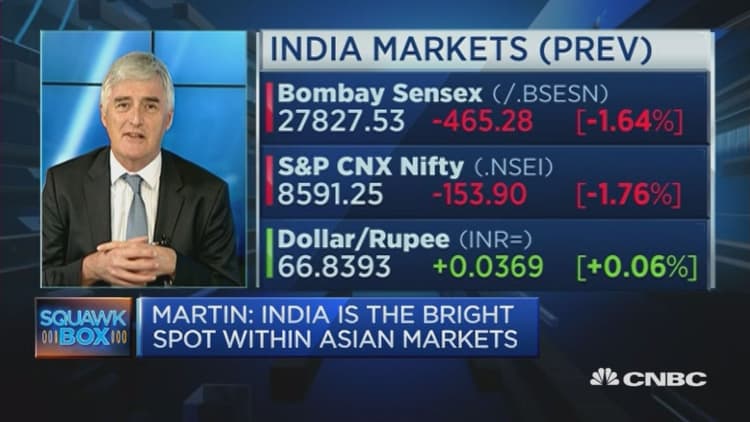
India's growing tensions with neighbor Pakistan may create short-term volatility in the stock market, but analysts said Friday the world's fastest-growing major economy was still a positive, long-term investment prospect.
On Thursday, the Nifty 50 closed down 1.76 percent at 8,591.25 and the Sensex fell 1.64 percent to 27,827.53 against a broadly positive trading backdrop in Asia. On Friday afternoon, both indexes traded near flat.
The Indian rupee fell from levels as high as 66.3175 against the dollar to as low as 66.9450 on Thursday following news that the Indian army conducted strikes against militants in Kashmir, which commentators said marked the biggest intraday fall of the currency since the Brexit vote.
"Risk sentiments soured amidst reports of Indian armed forces and neighboring Pakistan exchanging fire along the northern border," said Radhika Rao, an economist at Singapore's DBS Bank, in a note on Friday.
Investor sentiment was hurt Thursday after India announced its army conducted "surgical strikes" against terrorists along the Line of Control, which runs through the disputed territory of Kashmir. Pakistani military denied such strikes, calling them an "illusion" created by India, but said there had been cross border fire initiated and conducted by India.
This followed an attack by terrorists on an Indian army base in Kashmir where 19 Indian soldiers were killed, according to local media reports.
BNP Paribas' chief economist for emerging markets, Richard Iley, told CNBC's "Capital Connection" that Thursday's incident was a "military jab" as opposed to an "all-out hay maker" in response to the earlier attack.
"We are in a new era of uncertainty in this cross-border relation. By definition, [it means] more volatility, a higher risk premium which can be attached to Indian assets," Iley added.
DBS' Rao reckoned that while investors will be watching future developments closely, barring an escalation, the current weakness in Indian stocks was "mostly driven by profit-taking interests after the sharp year-to-date rally."
The Nifty 50 was up 8.11 percent year-to-date, while the Sensex has gained 6.54 percent for the same period. By comparison, the MSCI Asia Pacific ex Japan index was up 10.82 percent.
India's 'cyclical upturn' an opportunity
Investor sentiment towards India has grown notably since Narendra Modi's government came into power two years ago and introduced sweeping reforms that included opening up key sectors such as defense and aviation to foreign investors.
India's growth trajectory is also expected to accelerate, while the pace of global growth is set to crawl, with a host of political and economic uncertainties looming over major world economies including the U.S., China, Japan and the UK for the rest of the year.
"India seems to be on a cyclical upturn, with a pretty good government and isolated enough from international events that you could look for opportunities there," Richard Martin, managing director at IMA Asia, told CNBC's "Squawk Box" on Friday.
BNP's Iley further pointed to the fact that the Indian economy has also become more competitive. According to the World Economic Forum's latest competitiveness survey, India climbed to 39th from the 55th position it finished in the previous year.
"This really speaks to the gradual, progressive improvement in the business climate [in India]," he said, suggesting a slowing growth in China was further swinging momentum towards the country.
Iley added the equity market's relatively high valuations were backed by the country's sound fundamentals. "There's a lot of money still wanting to come into India ... we do get these types of risk events, and the market will be prone to pull back but ... a big down draft in stocks look pretty unlikely at this stage."
For investors looking for opportunities in the country, Martin pointed out two key sectors - manufacturing and consumer firms.
The manufacturing sector is expected to receive a boost when India's historic goods and services (GST) reform bill, approved in parliament in early August, comes into play next year, when it is set to simplify India's byzantine tax infrastructure.
"That is going to be a messy operation ... [but] it will favor the manufacturing sector, which has been struggling for a number of years," Martin said.
He added manufacturing firms would have an easier access to the national market as the reformed GST bill is set to replace a confusing mass of central, state, inter-state and local taxes with structured tax rates. "They don't have to pay all those fiddly little taxes every time they ship across state borders."
Consumer firms are also set to receive a boost from India's growing demographic of a large, middle class consumer base, according to Martin. "They break into two likes; the fast-moving consumer goods firms and now, more interestingly, the e-commerce players."
Recently, reports suggested U.S. retail giant Wal-Mart was in talks to acquire a minority stake in India's largest e-commerce player, Flipkart.
No risk from higher oil...yet
Following Wednesday's decision from the Organization of Petroleum Exporting Countries (OPEC) to hold talks about curbing production levels at their official November meeting, oil prices climbed some 7 percent.
As a net importer of oil, higher prices would theoretically increase India's import bill and exert pressure on the rupee.
DBS' Rao, however, pointed out OPEC needed to formally agree and implement a supply curb and then prices needed to rise to $60 a barrel before it became a serious source of concern for investors.


